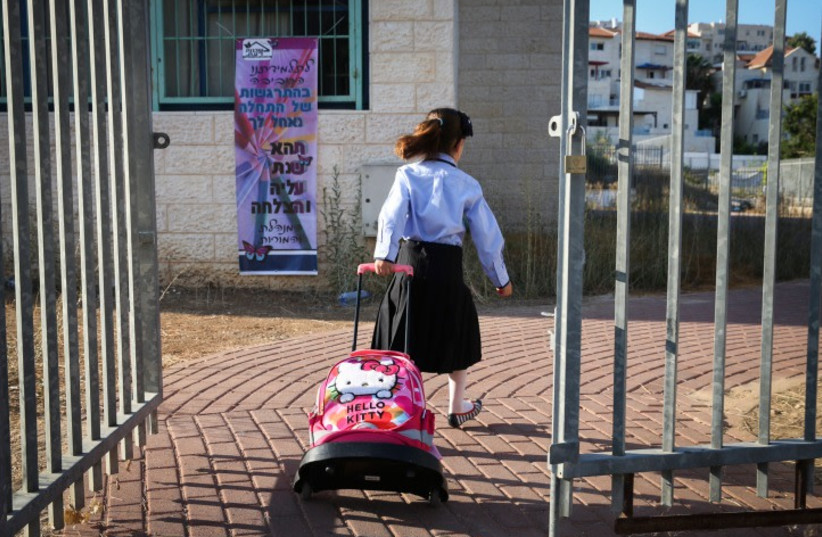In this latest installment of our ongoing series, we focus on the haredi community’s approach to education, building on previous discussions on military service and workforce participation. We explore the intricate balance between preserving identity and adapting to the evolving demands of society.
In the haredi community, identity is deeply rooted in a rich tapestry of traditions and values, making it less susceptible to abrupt changes. Every aspect of life in this community is closely intertwined with deep religious convictions. As observed in our previous discussions, changes that align with the community’s core values and pose a minimal threat to its identity tend to be more readily accepted. Education, a sphere as deeply embedded in values and identity as any other, is undergoing a similarly subtle yet significant evolution.
At the Tatia institute, we carried out a study focusing on mathematics and English education in the haredi community which sheds light on this evolving landscape. When these subjects were presented as individual disciplines, a significant 62% of haredi parents showed support for their children learning them. However, when they were grouped under the core curriculum label, associated with secular education, the approval rate dramatically dropped to 37%. This stark difference highlights the profound impact that narrative framing and sensitivities around secular perceptions have on the haredi educational system.
A further enlightening aspect was the divergence between individual preferences and perceived communal norms, as revealed in a subsequent part of the study. While many parents personally favored a more contemporary education for their children, they believed they were in the minority. This belief was put to the test when parents were asked to gauge the extent to which other haredi parents shared their educational aspirations. The results showed that only 22% believed their preferences were in line with other parents, marking a significant 40 percentage point drop from their personal preferences. This gap indicates a community at a crossroads, simultaneously grappling with the evolving educational needs of the times while striving to maintain its core values.
The Beit Belz Plan, introduced in June 2022, serves as a poignant case in point. This groundbreaking arrangement for core studies in a conservative haredi community marked a significant step in integrating subjects like mathematics and English into their educational framework. This move, indicative of the community’s willingness to blend traditional values with contemporary educational needs, was met with widespread public support. This response, even in the face of opposition from certain traditional elements within the community, signaled a growing openness to change that respects the community’s core values.

The acceptance of the Beit Belz Plan not only signifies a shift in educational policy but also reflects the community’s capacity for internal evolution. This development goes beyond mere administrative change; it demonstrates the haredi community’s ability to reconcile its strong educational values with the practicalities of current educational trends. The public’s positive reception of this plan, despite opposition from some traditionalists, is a testament to the community’s readiness to embrace forms of change that are not threatening to their identity.
A nuanced approach to haredi education
This nuanced approach to education indicates a broader trend within the community – an acknowledgment of the need for change, balanced with a deep commitment to preserving core values and traditions. The Tatia institute’s study did more than provide statistical data; it highlighted a cultural shift. The difference in response to subjects labeled as core curriculum versus their presentation as individual subjects like mathematics and English underscores the community’s sensitivity to external influences. Yet, it also reveals an underlying willingness of the community to incorporate these subjects into its children’s education, provided they are framed in a way that aligns with the community’s values.
THE DISCREPANCY between individual preferences for contemporary education and the perceived communal norm opens up significant opportunities. It suggests the presence of a quiet yet potent current within the haredi community – parents desiring a more current and relevant education for their children. Though this group might appear to be in the minority, it reflects a sentiment that is more widespread than initially perceived. Addressing this gap between individual aspirations and perceived community norms is crucial for creating an environment where educational changes are more widely accepted and implemented.
As the community continues to navigate the challenges and opportunities presented by an ever-changing society, its journey offers a compelling case study in the dynamics of societal change. The haredi community’s experience illustrates that change, when introduced carefully and respectfully, can be integrated into the fabric of tradition without compromising its essence. This process also emphasizes the critical role of language and narrative – how the framing of words can either pave the way for new possibilities or reinforce existing barriers.
The narrative of the haredi community’s engagement with education, military service, and workforce participation is a testament to the potential for harmonious evolution. It’s a narrative that speaks to the power of respecting and understanding deeply held values while embracing the inevitability of change.
